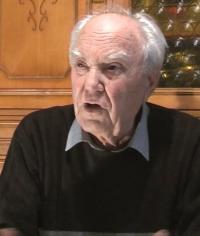Saved by a cousin

Stáhnout obrázek
Viktor Malinarić was born on 3rd of September 1923 in Fiškulini near Poreč. He grew up in a peasant family and remembers well his childhood in fascist Italy where children were being re-educated with various methods from an early age. As a shepherd, he soon encountered resistance activists and when Italy surrendered, he joined partisan units who entered Poreč. After retreating to Gorski kotar, he went to Slovenia with partisans where he got caught and was imprisoned. As a result of a gunshot wound, he lost a leg. At first he was in Karlovac but then was transferred to Ustaše‘s prison hospital in Zagreb which was located at today‘s bus terminal. He still remembers wounded prisoners being taken away without ever coming back and night visits by Ustaše guards. His story with a happy ending depicts the tragic reality of an Istrian man of the first half of 20th century. He was saved by his cousin whom he has never met before. The man was an Istrian refugee from fascism who became an officer in Home Guards army. Before fleeing to partisan army, he sold everything he owned in order to bribe hospital manager to transfer Viktor from hospital to prison where he saw the end of war. Usually, the only way from hospital led to Jasenovac camp. After the war, as an invalid of war, Viktor became a photographer and moved to Poreč where he received his pension as the city’s first post-war photographer.
